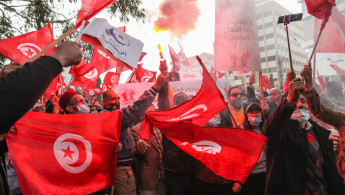Former Tunisian minister becomes latest victim of Saied crackdown
Tunisian authorities have continued to crackdown on Tunisa’s moderate islamist Ennahda party, ordering movement restrictions on a senior official, according to reports by The Independent.
Anouar Maarouf was summoned by Tunisia’s interior ministry to a police station where he was informed that his movements would be restricted to the neighbourhood in which he lives.
Maarouf previously served as the minister of communications from 2016 to 2020.
Tunisian President Kais Saied has previously suggested that the ministry of communications had been manipulated by political parties for their own advantage.
Saied rocked Tunisia when he announced on 25 July that he was suspending parliament, removing the prime minister from office, and lifting parliamentary immunity.
Many, including the Ennahda party, branded the move as a coup.
Maarouf currently represents the most senior individual to be targeted as part of Saied’s crackdown, and it is feared by other members of the Ennahda party that more could follow.
“There are no declared charges. The Minister of Interior has the right to take exceptional measures under emergency law declared by President Saied,” Ahmed Gaaloul, former minister and current advisor to the Ennahda party leader, Rached Ghannouchi said to The Independent.
“Now they have Anouar Maarouf tomorrow it will be someone else, they are targeting all regions in the public sphere not just the Ennahda Party,” he added.
“We call for a dialogue with Mr Kais Saied even if we disagree with him. We think what he is doing is unconstitutional and unlawful but dialogue is the best course.”
Prior to the move by the Tunisian president, nationwide protests had called for the resignation of the premier and the dissolution of parliament.
Many of the protesters have been angered by the lack of living improvements in the country, which they hoped would materialise after the Arab Spring. Economic problems and a mishandling of the coronavirus pandemic are among the concerns.
Amid accusations of a coup by his opponents, Saied has used public calls for a dissolution of parliament as a justification for his actions.
Despite the political chaos, and the politically aggressive moves made by the president, Gaaloul said that Ennahda would be willing to sit with Saied for discussions.
“We hope we can sit at a table and have proper dialogue with Mr Saied. In our view what he is doing is wrong, it is not in the best interests of the Tunisian people,” he said.





 Follow the Middle East's top stories in English at The New Arab on Google News
Follow the Middle East's top stories in English at The New Arab on Google News
![The UAE is widely suspected of arming the RSF militia [Getty]](/sites/default/files/styles/image_330x185/public/2024-11/GettyImages-472529908.jpg?h=69f2b9d0&itok=Yauw3YTG)
![Netanyahu furiously denounced the ICC [Getty]](/sites/default/files/styles/image_330x185/public/2024-11/GettyImages-2169352575.jpg?h=199d8c1f&itok=-vRiruf5)
![Both Hamas and the Palestinian Authority welcomed the ICC arrest warrants [Getty]](/sites/default/files/styles/image_330x185/public/2024-11/GettyImages-2178351173.jpg?h=199d8c1f&itok=TV858iVg)